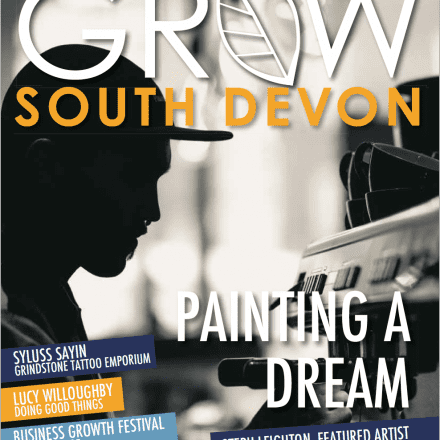
Independent Bookshops Are Rising Above The High Street Slump
Grow Talk by Sofy Robertson
The UK’s high streets have seen drastic changes in recent years. The shock closures of high street giants beginning with Woolworths and continuing on to more recent closures such as BHS and House of Fraser have markedly changed the retail landscape of towns and cities in Britain.
Every time I take a trip back to my home village and go for a wander in my nearest shopping destinations, Cheltenham and Gloucester, it always strikes me how much the high street has changed with a seemingly constant flux of shops, both independent and chain-owned, opening and closing their doors.
Exeter, too, has not been immune to the changing landscape of the high street as a concept, although admittedly it has faired much better than other South West cities; named as one of the fastest growing city economies not to mention being ranked by The Royal Society for Public Health (RSPH) as one of the healthiest high streets in the UK. Dubbed Exeter’s alternative high street, Magdalen Road has also found positive recognition by The Guardian when it was recognised as one of the ‘top ten cool shopping districts around the world’.
Despite this seemingly positive local picture of the high street, staggering figures published at the end of last year revealed that approximately 85,000 jobs were lost from Britain’s high streets with businesses going into administration or closing their doors. Alongside retail giants like House of Fraser and Poundworld who went into administration, a number of other large retailers including New Look and Mothercare opted to close some of its stores.
Figures such as these raised fears about the future of Britain’s high streets, where the number of premises left empty rose to more than 4,400 in the first six months of 2018 according to retail analysis from Local Data Company.
At this point you may be thinking, come on Grow, you’re a ‘relentlessly positive’ news company, what’s with all the doom and gloom? Well, after the bleak statistics reported on the health of the UK’s high streets at the end of last year, the new year has brought with it hope for the indies.
Independent bookshops in Britain are on the rise according to The Booksellers Association (BA) which revealed that the number of independent BA members has grown two years in a row.
BA said membership by independent bookshops in 2018 had grown by a total of 15. This builds on last year’s announcement that 2017 had seen the total grow for the first time since records began in 1995.
Meryl Halls, BA’s managing director said:
“It is extremely encouraging to see independent bookshops succeeding in 2018, demonstrating the creativity and entrepreneurship of booksellers in the face of difficult challenges… We do, though, also need to consider these figures in a wider context… Bookshops (especially our larger members) continue to experience unequal business rates, and struggle alongside wider retail with unfair competition from online retailers, as well as post-Brexit uncertainty.” (The Canary)
To delve behind the statistics, Grow Talk interviewed several local bookshop owners and managers to get their perspective on the Booksellers Association’s report and why it is important for the high street to retain its independentness.
A Personal Service
Paula Ponton from Bridge Books in Exeter discussed the success that they had found in the St Thomas area, saying:
“People who have bought books from the internet find that they can’t read them. They order large print but when it comes, it isn’t what they want so they come to us.”
Paula feels that independent bookshops like Bridge can offer a “personal service” that chain retailers and online retailers cannot:
“We can play them CDs they are interested in and we can give recommendations.”
Considerate Consumerism
An independent book shop owner in East Devon explained that owning an independent bookshop was “a lifestyle choice rather than a financial choice.” He felt that the success of independent bookshops came from an audience that “don’t want to shop on the internet”. He described this as his shop’s “core market”. He continued:
“In the last eighteen to twenty-four months, Amazon has received a lot of bad press in relation to their taxes and working conditions. People are deciding to make a more conscious moral choice. Similar to choices relating to plastic and sustainability, people are making more informed choices.”
The concept of ethical consumerism is one that is becoming increasingly popular in other areas of retail, from national brands taking a stand on societal issues that affect them and their consumers to smaller chains like Boston Tea Party receiving national recognition for their ethical and sustainable choices.
Algorithm and Mass Marketing Free
Dee Lalljee, manager of Crediton Community Bookshop, a not-for-profit shop owned by over 300 community shareholders, explained that “every purchase from us has social value” as customers are “investing in our community”. For indie owners and managers like Dee, it has not necessarily been an easy journey to keep their doors open:
“Independent booksellers have been creative about adapting to changes on the High Street and are committed to providing valuable resources as hubs for arts and culture in their communities. They work with other local organisations, run events, workshops, bookfairs and other related activities.”
Dee is certain that independent bookshops like Crediton Community are able to offer services that set them apart from the chains and online sellers.
“Independent booksellers can choose stock based around the interests of their customers. They believe books are valuable and know books can change lives.”
In-line with the other independent owners and managers that I spoke to for this article, Dee spoke of the power of the consumer and the importance of our growing awareness of the impact of our consumerism.
“The health of the High Street and independent bookshops is reliant on customers becoming increasingly aware of their power as consumers. If people don’t want to rely on algorithms, computers and mass marketing to choose their next book, their local indie bookshop is the place to go!”
Cultural Centres For The Community
Wayne Winstone, owner of Winstone Books in Sidmouth, believes there are two factors involved in the increase in independent bookshops across the UK. He explained that those opening independent bookshops were likely to come from large-scale bookshop chains or from more corporate, high-paced backgrounds who had grown disillusioned with this type of work-style. Wayne emphasised the importance of supporting local independent bookshops, saying:
“If you don’t use your high street, it will be converted. It is extremely important to shop local in order to preserve all of the things you love doing, like going for a coffee with friends or taking your children to a bookshop.”
Wayne believes that the death of local high streets “leaves towns and communities soulless.” He described them as “dormitory towns; merely places where people eat, sleep and go to work.”
Wayne’s passion for his industry was clear as he continued:
“Bookshops are extremely culturally important. We have such a rich history of important writers and we need to keep our heritage alive.”
Wayne was adamant that independent bookshops are necessary to “encourage the next generation” to read and become readers and strengthen the bond that is created between parents and children through sharing books.
More Than Just A Shop
After talking with local bookshop owners and managers, it became clear that they viewed their shops as more than just a retail space. With almost 130 libraries closing in 2018 alone bringing the total to 600 closures since 2010, independent bookshops have become community spaces and hubs through which to celebrate a culture of reading. Wayne epitomised this by saying:
“Independent book shops like mine are a cultural centre for the community. We are active members in the town, bringing in authors and holding events like children’s story time.”
This community role, one which was arguably filled by the local library, has become more important than ever as libraries across the UK have closed their doors for good. It also stands to reason that the rise in ethical consumerism, from choosing the most ethical coffee shop to making a lifestyle choice to go vegan or avoid nitrites in meat, may benefit independent bookshops due to the negative publicity surrounding some of the bigger players in the game.
It is easy to preach in ideals; ideally we would buy everything from our food to our clothes and books from local retailers. Reality, of course, is a very different thing in lives that have become increasingly fast-paced and, for many, digital. Despite this, making a conscious effort to support your local indies when you can could make more of a difference than you think. As Wayne pointed out, if you don’t use your local high street, you’ll lose it.
Photo by César Viteri , Eli Francis, Jonas Jacobsson, Annie Spratt on Unsplash









